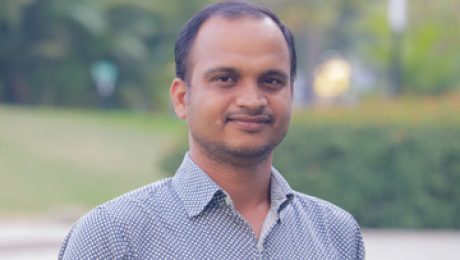Dr Sujith Kalluri’s research paper published in a reputed journal “Advanced Science”
Replacing Cobalt with Nickel in Lithium-ion batteries
Dr. Sujith Kalluri, Assistant Professor of Electronics and Communication Engineering, published a paper on “Building High-Rate Nickel-Rich Cathodes by Self organisation of Structurally Stable Macrovoid” in a highly reputed journal, “Advanced Science” having Impact Factor of 15.8. During his association with Samsung- UNIST Battery R&D Centre at Ulsan National Institute of Science and Technology (UNIST) South Korea, he began researching on the alternate battery cathodes for high-rate lithium-ion batteries, and proceeded the study at SRM University AP, Andhra Pradesh.
Cathode is one of the key components of batteries used in portable smart devices (mobile phones). Presently, batteries comprise of Lithium Cobalt Oxide as a cathode. Dr. Kalluri’s research focuses on the fast mobility of the lithium-ions present inside the battery with respect to the applied electricity. In his path-breaking study, he designed a new cathode for batteries, which is Lithium Nickel-rich transition metal oxide. He explains the supremacy of his designing Nickel-rich cathode, “When we did thorough electro-chemical and electrical studies, the lithium-ion batteries infused with nickel-rich cathode exhibited higher performance in terms of high current operations and elevated temperatures. Also, the Nickel-rich based lithium-ion batteries are a cost-effective substitute as the major portion of Cobalt is replaced with Nickel, a cheaper metal. These batteries can be employed in portable electronic devices and in larger scale, can be a promising candidate for e-mobility appliances.”
The research of Dr. Kalluri also aims at improving the “high current rate operation” which will ensure fast charging of portable devices and electric vehicles. When asked regarding his future research plans, he says “At SRM AP, we are establishing SRM – Amara Raja Centre for Energy Storage Devices in association with Amara Raja Batteries Limited. In this centre, we are planning to further optimize the lithium-ion battery technology, and also we will look beyond and try to implement sodium-ion battery technology for societal demands.”
- Published in News
Sports Fest 2020 at SRM AP, Andhra Pradesh
Inspiring the students to indulge in physical fitness regimes
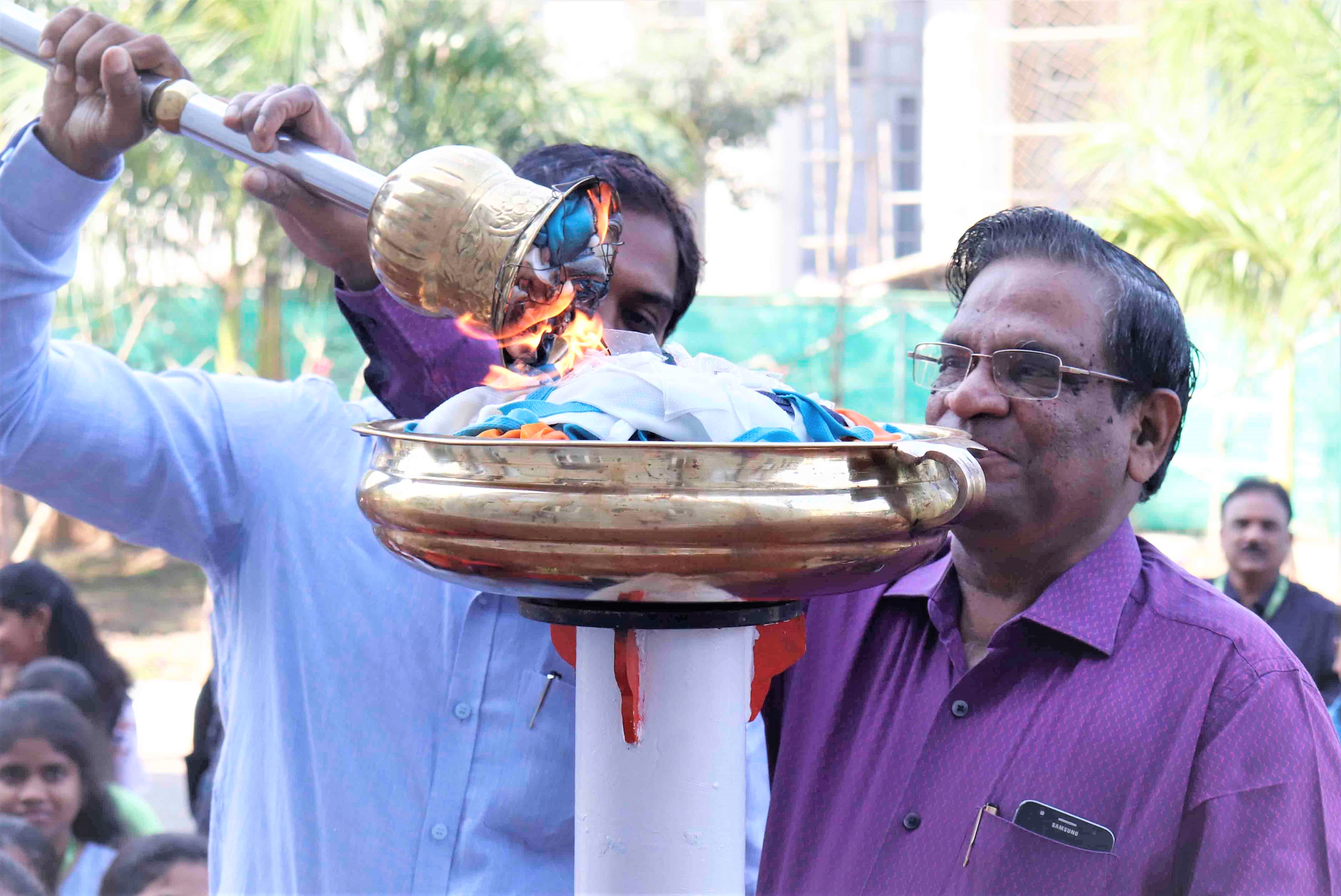 Inaugural Torch Lighting by Prof. D.N. Rao, Pro-VC.
Inaugural Torch Lighting by Prof. D.N. Rao, Pro-VC.
The third chapter of Sports Fest opened with the spectacular torch lighting ceremony by Prof. D Narayana Rao, Pro Vice-Chancellor, SRM University, Andhra Pradesh. The proceedings included welcome speeches by Prof. Narayana Rao, and Dr. D. Gunasekaran, while Dr. G S Vinodh Kumar, Fest Convener, and Dr. Abdul Mohimain, Sports Coordinator, Ms. Revathi Balakrishnan, Organizing Secretary graced the event.
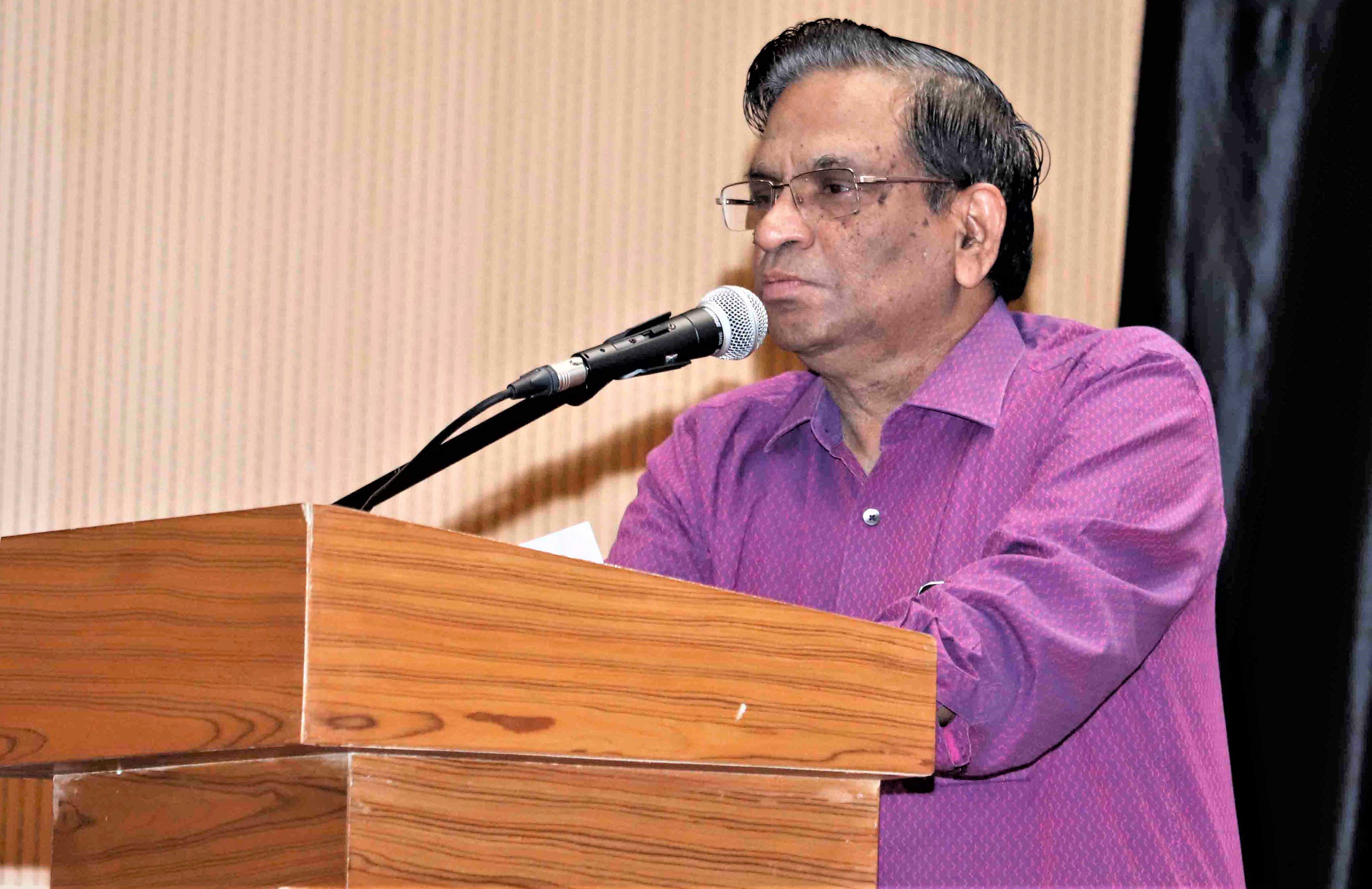 Welcome speech by Prof. Rao, Pro-VC
Welcome speech by Prof. Rao, Pro-VC
Dr. Rao took the centre stage to explain the significance of indulging in sports. He says, “The adherence to rules of sports trains one to be disciplined in their personal lives. Sports entails physical fitness which can be leveraged to improve the alertness of mind, further assisting the students to be able to work hard in the frontiers of academics,” Dr. Rao also trusts that team sports enable the youth to work together to achieve common goals by strategizing and executing plans in a given time frame.
Dr. D. Gunasekaran further enthralled the students with his speech where he emphasized physical fitness and a positive mindset being mutually reciprocal. He states, “The complex systems of our being are maintained by the body and controlled by the mind.” He expresses his concerns that the youth are inclined to indoor games and video games which are not synced to fitness. “A nation’s development depends on its youth, and India is a vibrant country where we have a substantial young population. Inspiring this population to maintain physical fitness will ensure the growth of our country.”, says Dr. Gunasekaran.
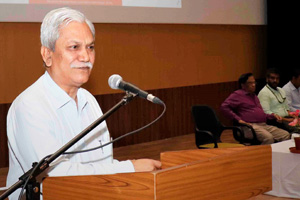 Dr. D. Gunasekaran, Registrar, speaks on importance of physical fitness.
Dr. D. Gunasekaran, Registrar, speaks on importance of physical fitness.On the note to uphold the essence of athletics, Pro VC declared the Sports Fest 2020 open. The two-day extravaganza featured events such as tournaments of football, cricket, basketball, volleyball, throwball, table tennis, chess etc. for both men and women students. Students from institutions like IIIT Nuzvid, Vasireddy Venkatadri Institute of Technology, R.V.R. & J. C. College of Engineering, Vignan’s Foundation for Science, Technology & Research, Prasad V. Potluri Siddhartha Institute of Technology, Dhanekula Institute of Engineering & Technology, K L University, SRKR Engineering College and many others enthusiastically participated in these events. On the first day, the knock-off rounds were played. Winners of the knock-out rounds geared up for the semi-final and final rounds. The next day decided the champions and runner-ups. Our boys of the football team played ferociously in the knock-out rounds and lost to the winning team only by one goal. As for the chess team, their brilliant strategies took them straight to the finals where they lost in the tie-breaker.
 Minds at play
Minds at play
 Aiming to score
Aiming to score Hits a SIX!
Hits a SIX!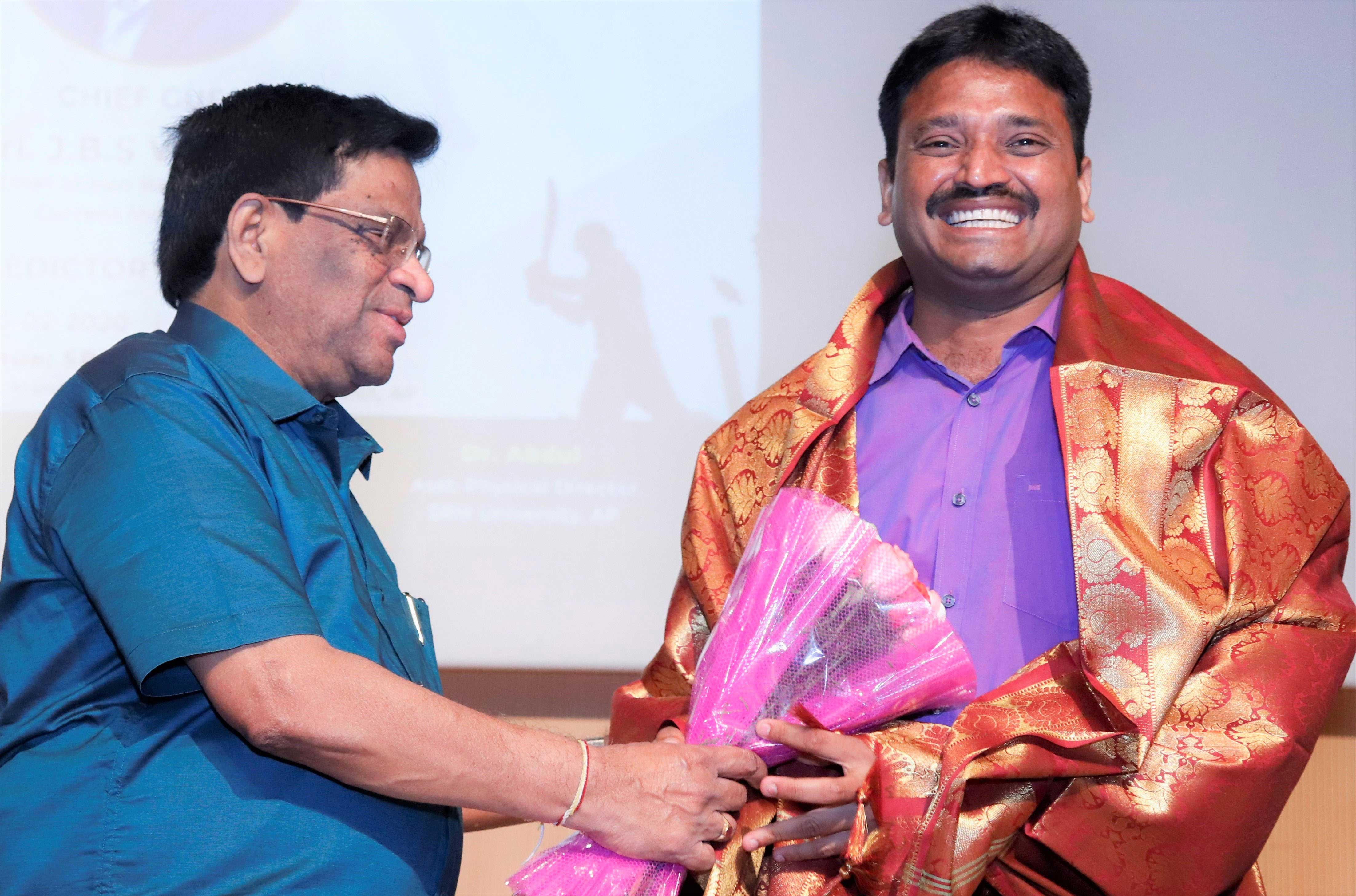 Pro-VC honouring the Chief Guest Mr. JBS Vidyadhar
Pro-VC honouring the Chief Guest Mr. JBS VidyadharOn 16th February afternoon, the Valedictory Ceremony began. Mr. JBS Vidyadhar, former Indian badminton player and present coach of the Indian Badminton Team graced the ceremony as a chief guest. Distinguished presence of Prof. D. Narayan Rao, Dr. D. Gunasekaran, Dr. G S Vinodh Kumar, Dr. Abdul Mohimain, Mrs. Revathi Balakrishnan, added dignity to the ceremony. The Men’s team of SRM University-AP bagged the runner-up prizes in football and chess tournaments. The women’s team of the university also secured runner-up positions in throwball, basketball and table tennis tournaments. Sri Rama Murthy, a member of the runner-up chess team of SRM University-AP, overwhelmed with joy, says, “this trophy has boosted our confidence. We hope to perform even better in the coming years.” K L University, with four champion’s trophies, was declared to be the overall champion of the Sports Fest -2020. With our national anthem in the background, this spirited festival came to an end with a promise of more successful events in the following years.
 Tackle at the football field
Tackle at the football field
 Distinguished guests with SRM University, AP Sports Team
Distinguished guests with SRM University, AP Sports Team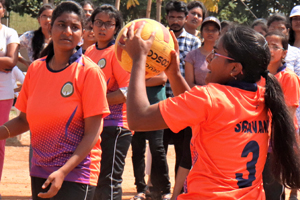 Throwing to win
Throwing to win- Published in Events
Dr. Tapas Kumar Mishra
- Published in CSE Faculty, Faculty, SEAS
Agniswar Paul’s Pursuit of Excellence at SRM University, AP
It is said that excellence is the gradual result of always striving to do better than before. That means it is a journey, and there is no overnight success and no short cuts to excellence. Agniswar Paul’s pathway to excellence has found a new direction since he joined SRM University, AP. Agniswar is a 3rd-year Electronics Communication Engineering Undergrad student at SRM AP and has been working on research and developing technologies that can help people in meaningful ways.
Agniswar states that prior to joining SRM University, AP he had no exposure to technology or programming experience at all but had a vision in mind that he wanted to make himself capable enough to achieve his career goals. With this objective, he has been working relentlessly on building his skill sets through his course work and his experience at the Next Tech Lab. His focus is on using the Internet of Things (IoT) to develop solutions relevant to society. He regards the founders of Next Tech Lab Anshuman Pandey and Aditya as his mentors who have guided him continuously on the abilities he needs to develop to make the most of working at the Lab.
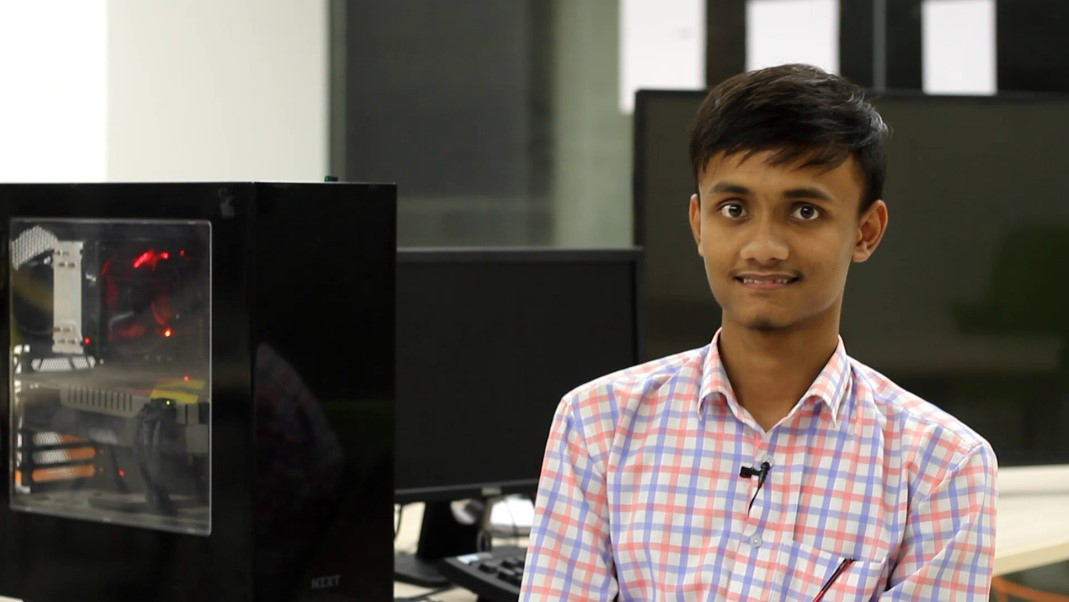
The first project Agniswar worked on was Plant Coin. In this exciting and socially relevant project, he helped develop a product wherein sensors detect whether a particular plant requires to be watered. When this point is triggered, 10 registered users simultaneously receive an SMS on their mobile phones. The person who waters the plant first gets reward points, thus gamifying the simple task of watering plants. The plan is to scale this to a level where people get more involved with caring for plants and trees, which would immensely benefit the environment.
His next stop was a project to help farmers. Almost 2/3rd of the Indian population is dependent on agriculture, and most of this workforce is marginalised farmers who can use all the help they can get from technology. Alongside 3 other Lab members, Agniswar initiated a project that would reduce the uncertainties around weather and water management for farmers, thus improving their ability to plan as well as meet untoward developments. Timely information about the weather and related matters was a vital element of this solution. Working on this project for 5 months led to getting the product ready, and they are writing a research paper on it. The article got accepted for publication in the IEEE Journal, one of the world’s largest technical professional organisation dedicated to advancing technology. The publication was not a modest achievement. IEEE has a very rigorous screening process with reviews by 10-15 members who score the submissions between -3 to 3. If the paper is accepted, then it is presented by the authors at a research conference. Agniswar’s team presented the paper at a conference in IIT Kanpur in July 2019, which he counts as excellent exposure.
Not one to rest on his laurels, Agniswar published a second paper, which was accepted in September 2019, for which he attended a research conference in November 2019 in Singapore. This paper wrote on the intelligence of robotics. Currently, he is working on his third research paper which involves combing IoT with augmented reality. The fusion of IoT & augmented reality promises to be immensely helpful for students who use equipment to run experiments.
Besides such projects, Agniswar has participated in 4 Hackathons so far, and his team has won every one of them. These were the Los Angeles Hacks, San Francisco Hacks, Developer Week, and Minerva.
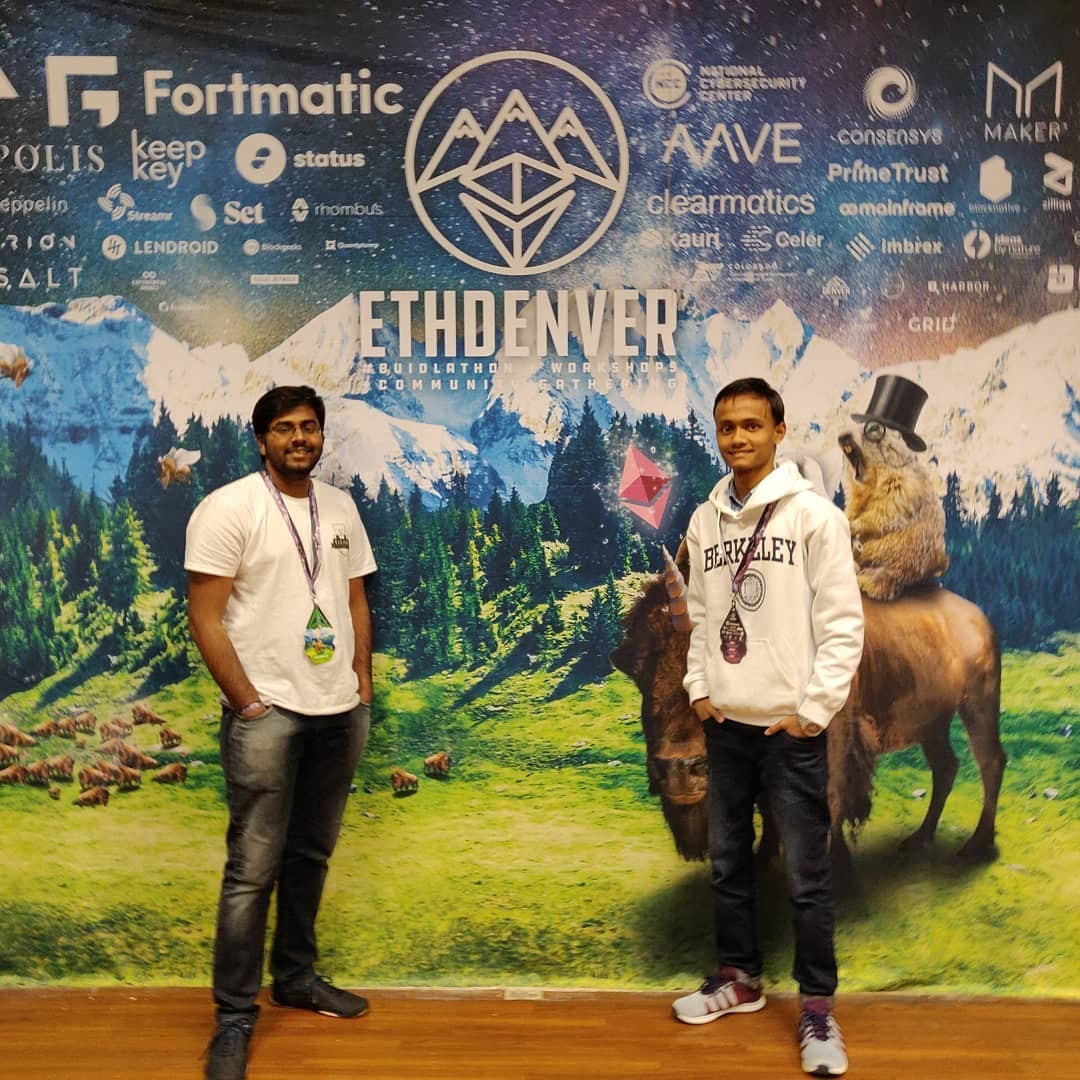
Last semester Agniswar went to the University of California, Berkeley (one of the world’s most renowned technology school) and became a part of Robotics Lab. After a rigorous screening and interviewing process, he was accepted by the lab to work there for three months.
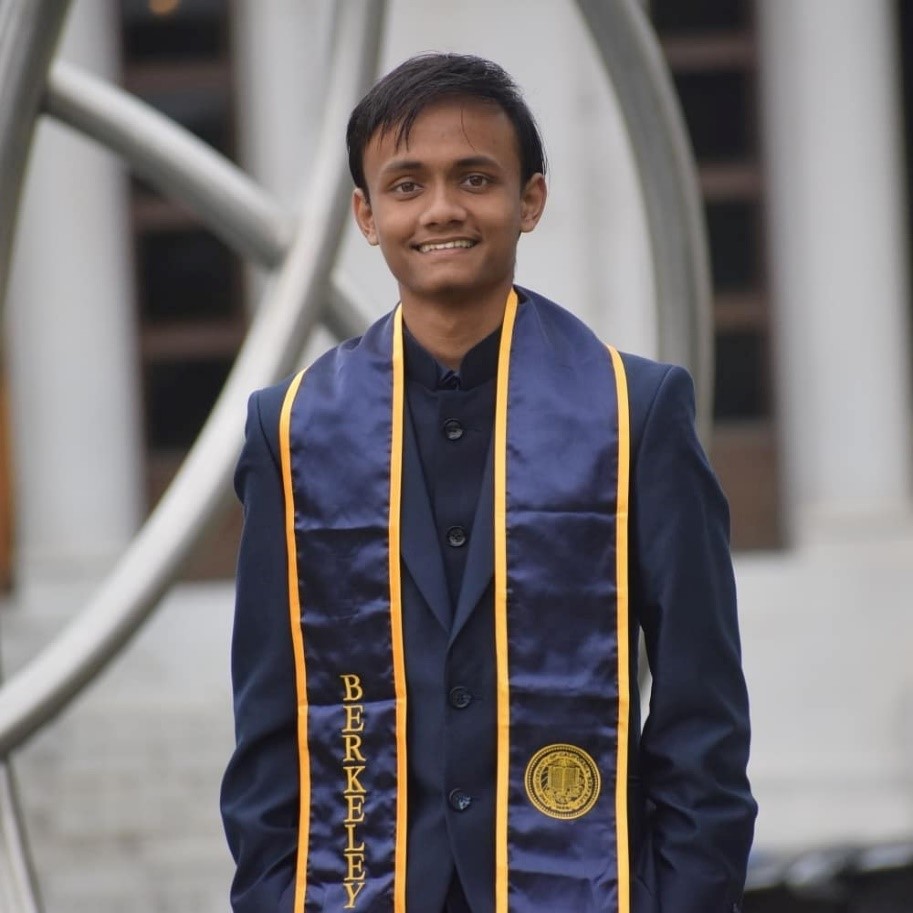
For students like Agniswar who was intent on pursuing research and real-life projects, SRM University, AP offers a conducive environment where students like him can push their limits, gain exposure, and have a real impact. This research focus and encouragement of students like Agniswar make SRM University, AP one of the most dynamic centres for learning for those who want to pursue excellence as a way of life and see their work have a meaningful impact.
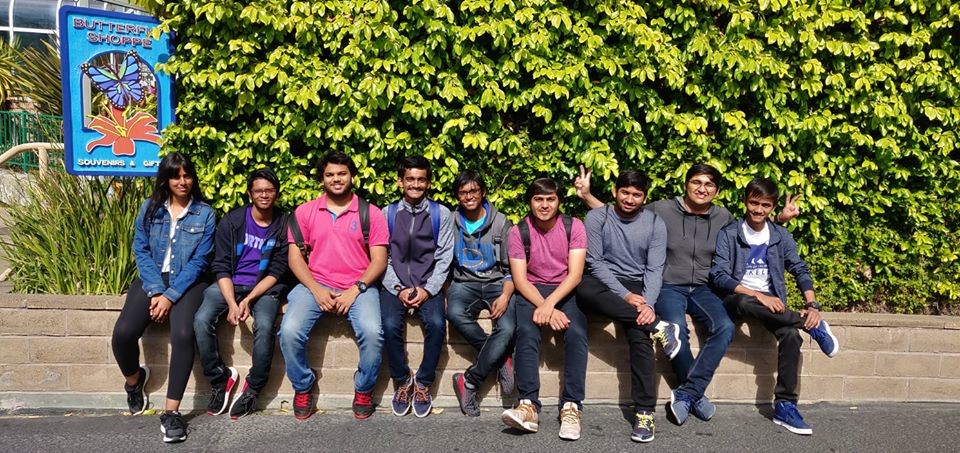
Industry Academia Summit 2020
Interactive session with industrial inventors
Inauguration of the first Industry Academia Summit at SRM University AP, Andhra Pradesh was graced by the presence of eminent personalities- Smt. R.K. Roja, MLA, and Chairperson of APIIC, Sri Vijay Naidu Galla, Chairman-CII Andhra Pradesh, and Sri S Vijay Anand, CEO, Amara Raja Batteries Ltd. representing the Government, Industry, and Academia along with Prof. D Narayana Rao, Pro VC, Dr. D Gunasekaran, Registrar, Dr. GS Vinod Kumar, Convener. This summit is organized in association with Confederation of Indian Industry (CII) which provides a platform to bridge the gap between industrial needs and academic research.
The inaugural ceremony began with lamp lighting by distinguished guests. Dr. Narayana Rao welcomed the guests and introduced SRM University, AP as a multidisciplinary research intensive institute. He says, “The students have international exposure and experience through internships, semester abroad programs in partnership with MIT and UC Berkeley. Our university worked on projects such as hardening of gold alloy and 3D printing on gold jewellery in association with Tanishq. Also, SRM Amara Raja Centre of Excellence will be established in SRM AP for developing energy storage devices. SRM AP is also working at the flagship project of developing hydrogen infused railway engines in partnership with the Indian Railways.”
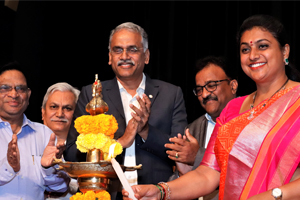 Inaugural Lamp Lighting by Smt. Roja
Inaugural Lamp Lighting by Smt. Roja
Prof. Narayana Rao also emphasizes on the necessity of this summit. He explains the significance of translating research for the improvement of the society’s lifestyle. He says, “Due to the advent of corona virus in China, the price of paracetamol tablets in India has increased 40% in the last three weeks. This is contributed by our pharmaceutical industry’s substantially dependency on the ingredients imported from China. Therefore, the government requires to initiate efforts to promote and nurture an environment for researchers where they can deliver cost effective solutions to such challenges.” He further says, “It is necessary that the corporates should start relying on and reaching out to the academicians and researchers in India, and not foreign nations. The timeframe of the research should be agreed upon to achieve the desired goals. It is also important for the industrialists to be aware of the expertise of the Indian researchers. There is a need of paradigm shift from foreign reliance to self-reliance. The collaborative model among industry and academia must evolve keeping pace with the dynamism of industry.” Professor Rao also coined the term Corporate Professor and requested the professionals from industries to teach the students and prepare them for the future. He also suggested that the academicians should work in the corporate houses to understand their requirements.
CII was founded in 1985 to encourage collaboration among industrialists who can march forward to self-sufficiency through exchange of knowledge and skills. “CII works as a catalyst to promote entrepreneurial talent pool emerging from the universities”, says Sri Vijay Naidu Galla. He further discusses the gap between knowledge creation and utilization, and also offers solutions to bridge the gap. “Post liberalization in 1991, more private universities have emerged as important players in education and significant women students are excelling at academics. India is targeting at $5trillion economy for which we require a 9-10% growth in GDP. He suggests that the government should facilitate the growth of institutions which can provide quality education by monitoring their performances and offering incentives in the form of specific assistance to the good performers. The industries should incur expenditure on supporting academic institutes that indulges in research work. Innovative ideas should be used to transform the traditional curriculum and align it to the industrial needs. The institutes should create a lifelong learning environment, imbibe values and ability to work as a team, and be able to empathize with the society and understand its needs.
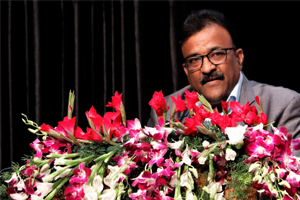 Sri Vijay Naidu Galla speaks on understanding the societal needs
Sri Vijay Naidu Galla speaks on understanding the societal needs
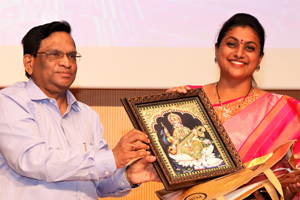 Presentation of the Memento to Smt. Roja by Prof. Rao
Presentation of the Memento to Smt. Roja by Prof. Rao
Smt. R. K. Roja shared the initiatives taken by the Government of Andhra Pradesh to inspire the youth to indulge in research. She also discussed the vision of the Govt. of Andhra Pradesh in the next five years in this domain. She has also appreciated SRM-AP’s infrastructure and research initiatives. She believes, “The collaborative research between the industry and universities like SRM-AP will help the youth to do revolutionary work in nation’s progress”. Smt. R. K. Roja shared the initiatives taken by the Government of Andhra Pradesh to inspire the youth to indulge in research. She also discussed the vision of the Govt. of AP in the next five years in this domain. She has also appreciated SRM-AP’s infrastructure and research initiatives. She believes, “The collaborative research between the industry and universities like SRM-AP will help the youth to do revolutionary work in nation’s progress”. She further says, “Our youths already have the qualities that are needed for pathbreaking research. However, the necessary skill-sets that are required in Corporate environment is still missing. The government of AP has already implemented some policies to overcome this. Also, to help and support the industry in every way possible, Government of Andhra Pradesh’s Industry Policy is in place. Single Desk Policy has been introduced to make processes easier for the industry personnel.”
Sri Vijay Anand spoke of harnessing the potential of imaginative students. He says, “In India, infrastructure is not a bottleneck, it is already churning out half a million tech graduates a year. We are abundantly endowed with human capital.” He spoke of a Japanese term called “ikigai”, which identifies with a man who loves what he does, in which he is good at, and what he does provides solutions to society’s problems. He also spoke of emerging trends in the technological sphere such as AI, ML, Bioelectronics, and genome research. “Industry and academics, facilitated by the government needs to exploit the technology and find a common purpose so as to align to each other’s working methodologies”.
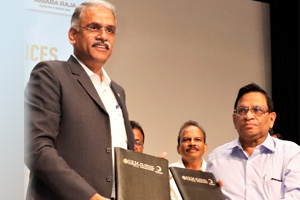 MOU Signing Between Amara Raja Batteries Ltd and SRM University-AP, Andhra Pradesh
MOU Signing Between Amara Raja Batteries Ltd and SRM University-AP, Andhra Pradesh
In order to uphold the spirit of collaboration between industry and academics, Amara Raja Batteries Ltd. and SRM AP signed MOU to develop Amara Raja Centre for Energy Storage Devices at SRM AP campus.
Picture credit (photography society)
Hemanth.P
AP1811001092
CSE-C.
Thota Mohan Sai Krishna
AP1811001029
CSE-A.
JAYANTH SATYANARAYANA.T
AP18110020072
ECE-B.
PINNINTI SAI SUKUMAR
Ap18110010545
CSE-09I.
- Published in Conferences
Bennet Benny’s Exciting JAIST Science Internship Journey
One of the key elements of holistic learning is gaining deep and wide exposure at an early stage. This helps students to gain both depth and breadth of knowledge, especially when it comes to international opportunities. SRM University, AP through its tie-ups with international universities of repute provides students with such exposure and also encourage its students to participate in events, conferences, competitions, and internships. One such internship is the Japan Advanced Institute of Science and Technology (JAIST) Minor Research Project / Internship. JAIST is an intensive research institute and was established in 1990. The internship itself is funded by the Japan Science and Technology Agency (JST), a government agency. Through this internship, JAIST works to create leaders capable of contributing to the making of a future world by contributing valuable in science and technology, through its most advanced education and research in an ideal academic environment.
Bennet Benny, a B.Sc. Physics, 2nd Year student at SRM University, AP won the Sakura Internship Program 2019 at JAIST recently. Under the guidance of Prof. Ranjit Thapa, Bennet had applied for the internship in March 2019 and his internship period was between 16th December and 24th December, 2019. Bennet’s focus under the supervision of Prof. Ryo Maezono of JAIST was on electronic structure calculations using DFT and QMC computational methods on one of the supercomputers located at JAIST. Before proceeding to Japan, Bennet was supported by SRM University, AP faculty who recommended books and reading material to familiarise himself with the complex topics that he was going to work on at JAIST.
For Bennet, the internship was an excellent opportunity to learn more deeply about quantum mechanics, which analyses properties of materials at the atomic and subatomic levels. At JAIST, he was joined by five other students from Bandung Institute of Technology, Indonesia and each of the interns was assigned a workplace with a PC at their disposal. For starters, they were then taught the basics of Linux commands and about parallel computing. These skills were later used to run the simulations of Density-functional Theory and Quantum Monte Carlo. The internship helped Bennet to get aware of computational physics, its advantages, uses and the latest research around it. He was especially thrilled about the opportunity to see and be given access to the supercomputers that are housed at JAIST.
More importantly, Bennet counts the opportunity to experience a new and unique culture and to meet and work with people from different nations as a huge source of learning. He got a chance to meet people from different nationalities such as Japan, Indonesia, and China through the course of his internship, which was also his first experience of travelling to a foreign country. Experiencing a new culture and gaining a new perception of education in Japan, he was able to gain the motivation and inspiration to work hard to pursue his higher education and research. Outside of the rigorous internship work, the students were given a guided tour of the beautiful city of Kanazawa, where they visited the Kanazawa castle and the Kenroku-en Gardens, which is known as one of the three perfect gardens of Japan.
Bennet feels the combined experience will be beneficial for his budding career. The opportunity has provided him with the chance to develop many skills that could help him to work in one of the research laboratories at SRM University, AP and also to start the pursuit of his research work. The internship allowed him to gain exposure in a new field and he now intends to implement this learning to his original goal of pursuing a Masters in High Energy Physics. He feels every student should grab all the opportunities that SRM University, AP presents and utilise it rather than dither at the thought of the challenges that come with it.
Career prospects in energy storage technology
What is Energy Storage?
Ever since humans mastered energy capture, energy storage and retrieval for use at a later point of time or place has been the key pursuit in power engineering. As per Wikipedia, “Energy storage is the capture of energy produced at one time for use at a later time. A device that stores energy is generally called an accumulator or battery.”
Video Link: https://www.youtube.com/watch?v=4JGMm8qDfxw
Why is it important?
Energy comes in multiple forms, which include radiation, chemical, gravitational, electrical, temperature, and kinetic. Energy storage technology converts energy from these forms into economically storable forms that are safe and accessible.
Energy storage systems are assuming greater importance with the increasing focus on sustainable energy (solar, wind, hydro) electric vehicles and the rapid rise in use of battery-powered electronic devices like smartphones, which has led to a surge in production of lithium-ion batteries. This makes energy storage one of the most promising upcoming sectors.
Insert video: https://www.youtube.com/watch?v=ljKFr_o24jo
What are the industries involved in Energy Storage?
When one thinks of Energy Storage, one immediately thinks of batteries. However, batteries are about storage and retrieval of chemical energy, but energy is of many different types. A hydroelectric dam, stores gravitational potential energy, ice storage tanks store ice frozen by cheaper energy at night to meet peak daytime demand for cooling, and fossil fuels such as coal and gasoline store ancient energy derived from sunlight, buried and overtime and then converted into these forms. Industry applications include power storage and distribution obviously, but also automobiles, real estate, mining, and telecom.
Video Link to‘Future of Energy Storage’ https://www.youtube.com/watch?v=_LAuDTNW5dw
Video Link to ‘Beyond Batteries’: https://www.youtube.com/watch?v=3R7EzO3uBms
Who is the field relevant for?
The demand for energy storage systems is likely to grow exponentially globally as the world shifts towards renewable energy sources. This shift will mandate both grid level and unit level energy storage systems that are of viable size, cost, and energy efficiency. Significant research is currently being conducted on materials, engineering, and other optimisations.
The kind of backgrounds required for this field could include:
- Metallurgists for analysing the potential of viable materials,
- Chemical engineers and chemistry graduates,
- Electrical engineers
- Automobile engineers interested in electric vehicle development
However, energy storage is somewhat interdisciplinary, bringing together material science with expertise in energy storage using sectors.
What are the career prospects?
Estimates by Lux Research, independent research and advisory firm, suggest that the global industry for energy storage could be worth $100billion in the next few years.
Given the focus, demand, and growth, energy storage sector will generate significant jobs in the future. Moreover, due to the shortage of qualified professionals relative to demand, entry salary and salary growth prospects are positive.
Typical job roles are:
- Storage Systems Engineer
- R&D Engineer
- Reliability Engineers
- Modeling Technician
- Consultant
As per comparably.com, Energy Storage Engineer salaries average around USD110,000. Reliable estimates for India are difficult to make since it is still a niche area.
How do I get started?
The roadmap involves an undergraduate degree in electrical engineering or material sciences with a focus on specific courses in renewable energy and energy storage.
- Published in Uncategorized
Careers in Nanomaterials
What are Nanomaterials?
Nanomaterials are substances or materials that are manufactured and used at a, as the name suggests a very small scale. ISO (2015) defines a nanomaterial as a ‘material with any external dimension in the nanoscale (size range from approximately 1 – 100 nm) or having an internal structure or surface structure in the nanoscale’.
Video Link: https://www.youtube.com/watch?v=DAOFpgocfrg
Why is it important?
Nanomaterials are the most recent and most exciting development in materials science. Nanoscale materials have unique optical, electronic, or mechanical properties. Thus, when compared to the same material which is not at the nanoscale, they show more optimal performance measured typically in strength, chemical reactivity or conductivity.
What are the industrial applications of nanomaterials?
The scope, unlike the size of nanomaterials, is massive:
• Better building insulation,
• More energy efficiency,
• Better batteries,
• Better cosmetics,
• Nimble automobiles, aircraft, ships, spacecraft
There is nothing nano about the potential for nanomaterials and nanotechnology. There is every possibility that this field will touch just about every industry that exists today and will even create new and unthought-of applications.
Video Link: https://www.youtube.com/watch?v=fY0E4xRyfek
Who is the field relevant for?
Considering that we have only just begun to understand the scope of development and application of nanomaterials, the future for this field is bright.
The kind of backgrounds required for this field could include:
• Engineers,
• Material Scientists, and
• Physics, Chemistry, and Biology graduates.
However, nanoscience is essentially interdisciplinary wherein science is applied to engineering and hence a holistic mindset/approach is needed.
What are the career prospects?
As mentioned, the industries requiring this expertise are extremely diverse. Currently, nanomaterials have seen significant adoption in sectors like:
• Electronics,
• Textiles,
• Polymers,
• Packaging,
• Transportation,
• Sporting goods,
• Computing,
• Medical equipment,
• Forensics,
• Military and
• Energy, among others.
According to the widely followed recruiter.com, salaries in the USA range between $45,000 and $73,000for nanotechnology engineering technicians. Estimates for India are not easily available since it is a nascent yet growing field, though fact remains that there are very few qualified professionals in this field. Needless to say, as use of nanomaterials expands, engineers with significant experience can see their salaries grow significantly in the coming years, more so since demand will outstrip the supply of candidates.
How do I get started?
The pathway starts from an undergraduate degree in engineering or sciences with a focus on specific courses in nanotechnology, nanomaterial, or nanoscience. Alternatively, with the growth of nanoscience in India, several universities, including SRM AP offer undergrad and masters courses with specialisation in nanotechnology. This can be coupled with the many options available at the PhD level.
Engineering Physics: Great Career Choices
What is it?
Engineering Physics refers to the combined disciplines of physics, mathematics, and engineering. The field seeks ways to apply, design, and develop new solutions in engineering and holds promising career prospects for interested graduates of science or engineering.
Engineering Physics is unlike both traditional engineering or science disciplines – it does not restrict itself to one area. The focus is on applied physics covering highly specialised fields such as quantum physics, materials science, applied mechanics, electronics, nanotechnology, microfabrication, microelectronics, computing, photonics, nuclear engineering, biophysics, control theory, aerodynamics, energy, solid-state physics, and others.
The focus on coming up with integrated solutions sourced from multiple specialities ensures that the solutions are more optimal, effective, and efficient. The cross-functional focus also closes the gap between theoretical and practical sides of science and engineering.
Is it for me?
As stated, graduates of science or engineering can look to specialise in Engineering Physics. Scientists looking to move beyond theory, or engineers looking to create real solutions to tangible problems using theoretical rigour find this field exciting.
What kind of jobs can I get?
Qualified engineering physicists fit in into opportunities within high technology industries, some of which are in emergent domains. The roles span research and development, design, and analysis. The sector will depend on the engineering specialisation that is selected, i.e. mechanical, computer, nuclear, aerospace, etc.
Engineering Physics is well poised to grow as a segment specifically because of the many new sectors in which it has application as well as the technological progress in the last decade that has created entirely new industries. Some of the critical areas that will see job growth are discussed below.
Agro Physics
The pressures of a growing global population and the need for sustainable agriculture are going to [belatedly] lead to science and engineering, playing a more significant role in how we grow crops. Agro Physics is an evolving field, and it involves the study of materials and processes in the sowing, harvesting, and processing of agricultural produce.
Artificial Intelligence
Artificial Intelligence or AI refers to machines that mimic human cognitive functions such as learning and problem-solving. This exciting field is growing by leaps and bounds and holds great promise in the automation of many processes besides an exponential growth in processing capacities.
Biomechanics
Biomechanics involves the study of the structure, function and motion of the mechanical aspects of living systems. The field touches applications such as aerodynamics, orthopaedics, locomotion, pathology, oncology, among others.
Bionanotechnology
Bionanotechnology refers to the combination of nanotechnology and biology. Here, biosystems within nature are used as inspiration for creating new nanodevices or nanoparticles. Nanomedicine is the open field that is looking to benefit from the progress made in Bionanotechnology, while agriculture is another sector that will see the application of new solutions.
Composite materials
A composite material is made from two or more constituent materials with significantly different physical or chemical properties that, when combined, produce a material with characteristics different from the individual components. The objective could be to make the composite lighter, stronger, harder, softer, resistant, flexible, rigid, etc. While composite materials have existed since ages (concrete and steel are composite materials!), limits in the development of new materials are constantly being pushed through progress in Engineering Physics.
Machine learning (ML)
ML is a subset of AI and refers to algorithms and statistical models that computer systems use to perform a task without any instructions input by human operators, relying on patterns and inference instead. ML is beginning to find application across many sectors including primarily Economics, Finance, Forensics, Medicine, Search Engines, etc.
Microfabrication
The miniaturisation of various devices (think about the first cell phones and compare them with devices today) has led to the need for Microfabrication, which is the process of fabricating miniature structures of micrometre scales and smaller. Progress in material science, nanotechnology, and other fields have led to growth in possibilities in this field.
Nanotechnology
Nanotechnology is the manipulation of matter on an atomic, molecular, and supramolecular scale. Apart from medicine, Nanotechnology holds immense potential for multiple industrial sectors such as defence, textiles, food packaging, sports, construction, and energy. The fruits of the research conducted in this exciting field over the years are only just beginning to be realised.
Neural engineering
The human neural system is an extremely complex arrangement linking the brain with the rest of the body. Neuroscience is still making tentative progress in understanding how this system works and this pace has quickened lately, thanks to the improvement in imaging systems. Neural engineering is a discipline within bioengineering that uses engineering to understand, repair, replace, or enhance these complex neural systems. Aspects such as Neuroimaging, Neuromechanics, Neuromodulation, Neurorobotics, and Neuroregeneration hold great promise for patients who have been resigned to living with neurological disorders.
Robotics
Robotics is the right combination of Computer, Electronics and Mechanical Engineering with Physics. While Robots have existed since many decades now, the application across more sectors, the sophistication of the robotic systems, and their efficiency are being enhanced through the many technological developments. This will lead to productivity and efficiency gains across multiple sectors.
What A Business Studies Courses Needs To Be Future Ready
Learning business management is a complicated enough exercise with experts divided on whether management is science or art, or both. In the current era, the complications are compounded by the pace of change. Theories and frameworks are getting outdated rapidly, and textbooks can be obsolete by the time they reach the student’s desk from the printer. In this scenario, how does a student ensure that the business studies course is keeping him or her future-ready? The answer is not easy given the situation, but there are 5 universal aspects that few would dispute.
1. Practical experience
Many business studies courses are geared towards freshers with limited to no work experience. If the class itself offers no avenues for practical experience, then the student graduates with a skill handicap. Look for courses that provide hands-on business experience during studies. This can be in the form of industrial projects from real companies, internships, assistance on faculty research projects for companies, or even simple opportunities for interaction with the real business world. Being in actual situations, facing real problems of real people shapes your world view and the sooner you can gain this experience the better. For this, look for institutions that have tie-ups for such opportunities with their recruiters and other corporates.
2. Soft skills
Multiple surveys of companies show that one of the most significant handicaps campuses hire suffer from is poorly developed soft skills. This includes presentation skills, workplace etiquette, grooming, and general communication. All of these are essential requirements for workplace success and for moving into leadership roles. Some institutes have begun to focus on soft skills and developing the behavioural aspects of students. Conducting exercises and workshops on etiquette, grooming, communication, art, and team exercises are some of the means. Innovatively, some of this is being achieved through training in theatre or focus on the liberal arts.
3. People matter
In a networked and ever-changing business world, no one can function in a silo. Effective teamwork is essential in an era where multiple perspectives are needed to solve complex problems. And this means people need to be effective at working together. Empathy, accommodation, appreciating diversity, understanding and working with differences, and sensitivity are the critical skills that need to be developed for success and these are timeless. Institutes that build in teamwork and people dependencies into course work will help groom managers who can work effectively and efficiently with any group of co-workers. This is why many courses involve a large volume of team assignments, presentations, and projects.
4. Global perspective
Globalisation is a reality that no business, big or small, can ignore and this will only compound in the future as trade and people mobility go up in future. Even an entry-level business manager needs to be mindful, aware and prepared to work in a complex and interlinked world. How do you achieve this when many entry-level managers have not even stepped out of their city of birth? Developing the ability to work with different nationalities, being comfortable in foreign environments, and being able to blend into the unfamiliar is going to be must-have skills for the future and preparation needs to begin early. Courses that offer foreign language courses, cross-cultural collaboration opportunities, international exchange programs, diverse pool of international students, and opportunities to learn from visiting foreign faculty are one way to prepare for this business reality.
5. An entrepreneurial approach
Some theoretical concepts are timeless, while others whither away. However, new approaches to solving old problems and developing abilities to deal with new issues are always evolving. After all, many of the challenges and opportunities are seen today did not exist even 5 years ago. How would a graduate from then cope today and how will he/she deal tomorrow? The dynamism needed to face unique situations and problems come from developing an entrepreneurial mindset in students from an early stage. This mindset can be developed through a pedagogy that focuses on doing, experimenting, failing, learning, unlearning, and taking responsibility for one’s efforts. Courses that spoon-feed will soon disappear into the sands of time, as will the students who learned with such approaches.
Bear in mind that there is no course which will teach you all the skills you will need in the future. A course can provide you with timeless skills, some of which are listed above, and it can provide you with a mindset of flexibility, entrepreneurship, ownership, responsibility, and risk-taking. If you have these, then your skillset is indeed timeless.
At SRM University, AP the curriculum structure and pedagogy is designed to incorporate all of the above aspects. In addition to this, regular feedback from industry and recruiters is obtained to keep education relevant. Moreover, campus life, extracurricular activities, and the work involved in running the students clubs and societies provide students with exposure in all of these must-haves.
- Published in Blog, Management


